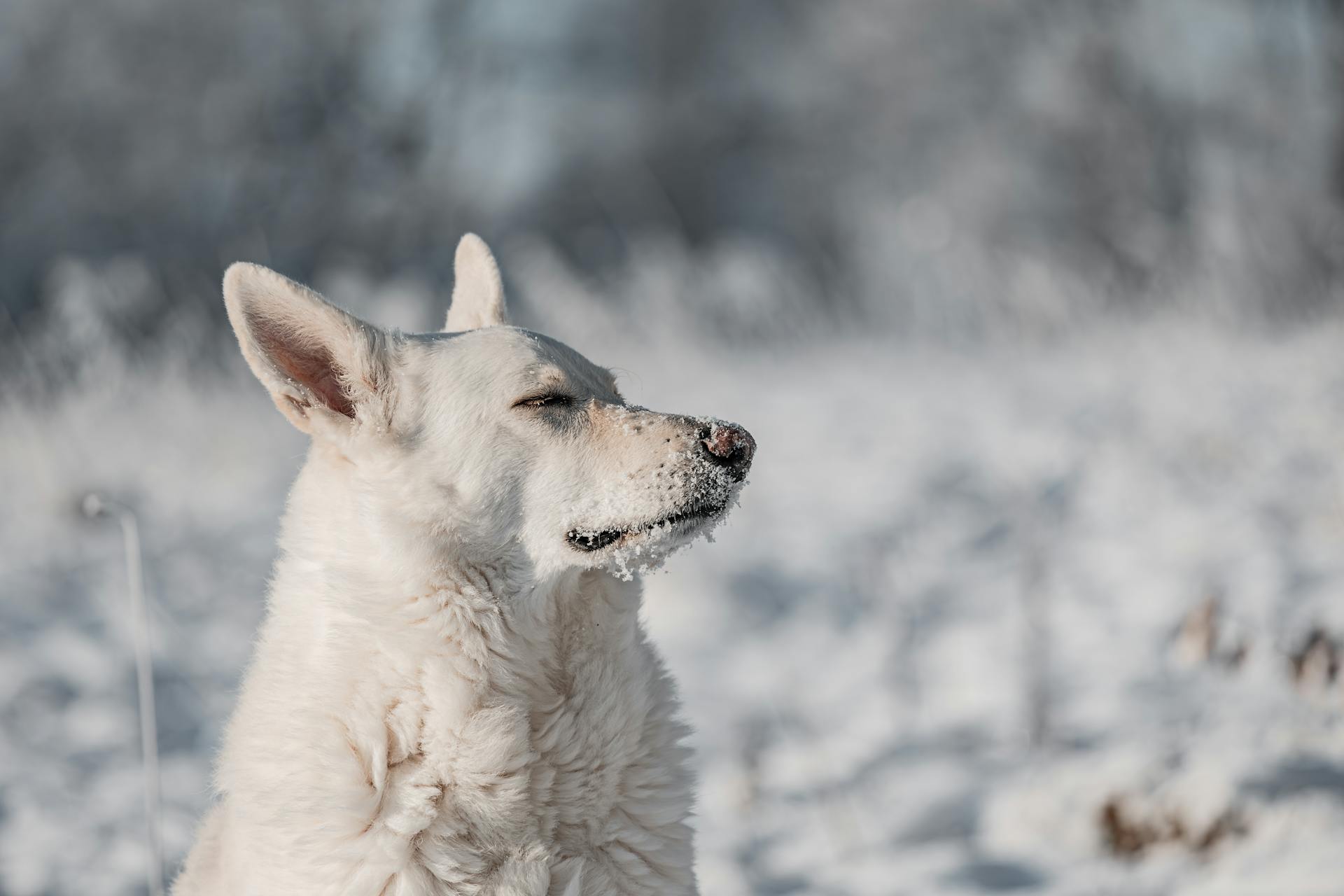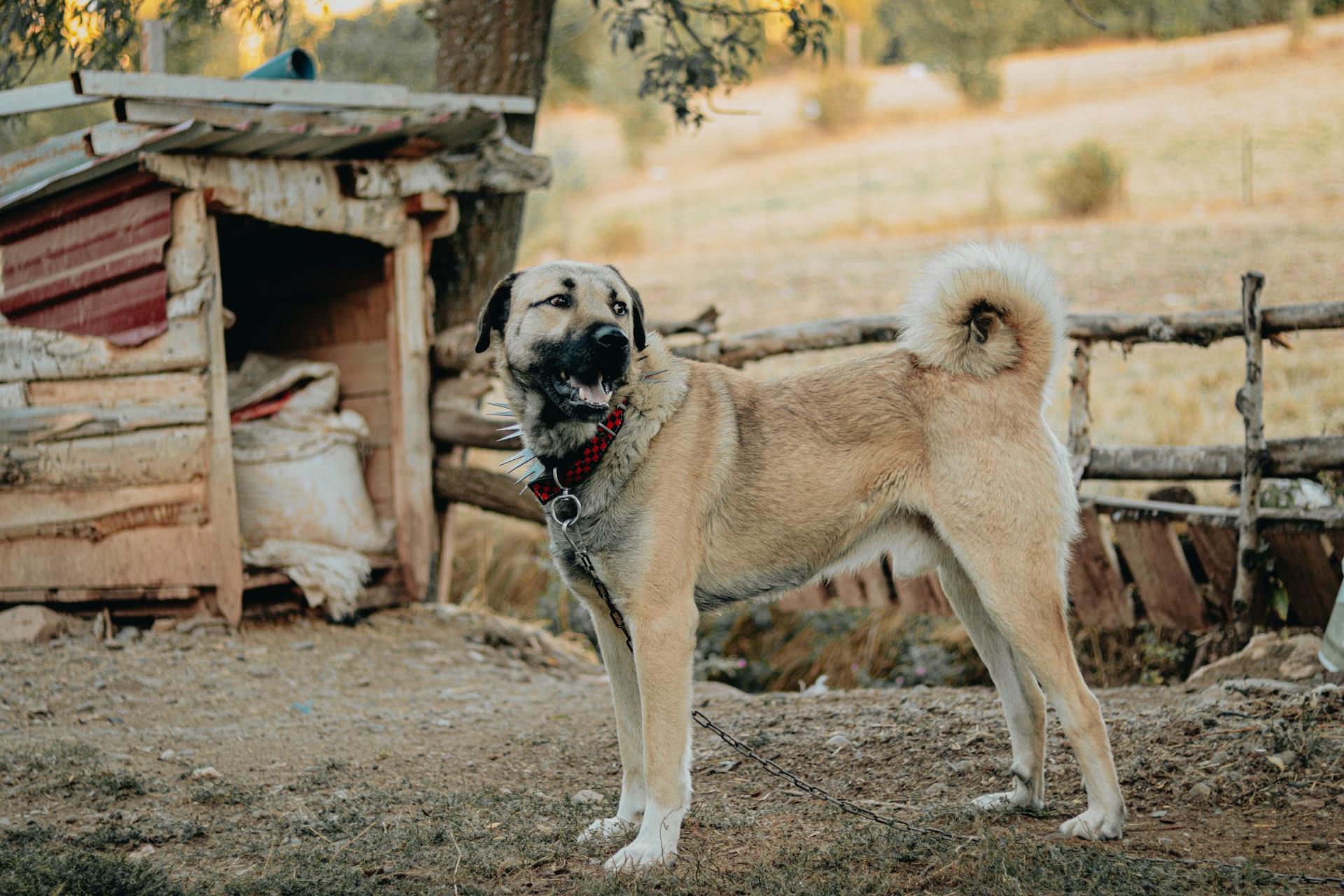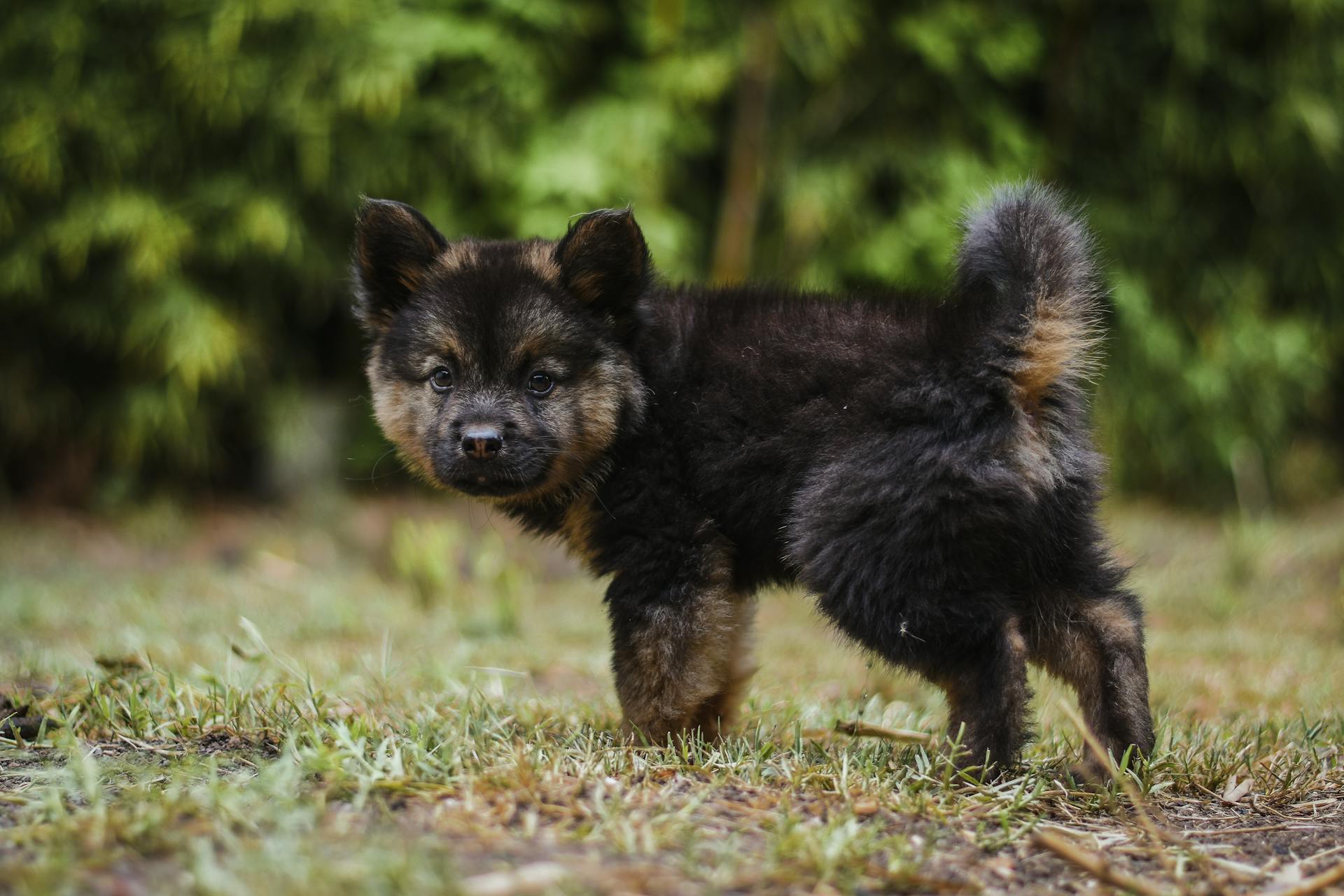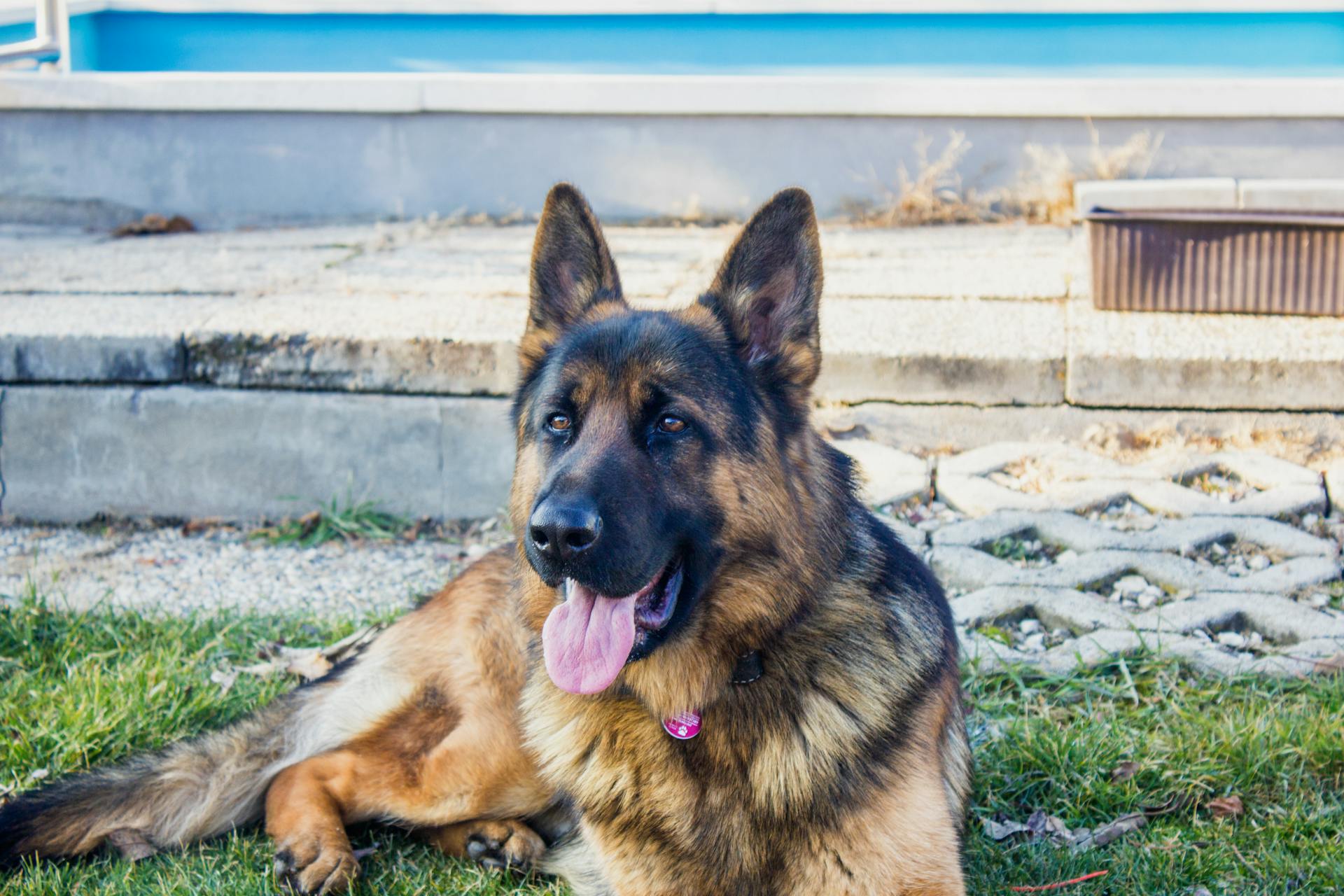
Georgian Shepherds are highly loyal family companions. They have a strong instinct to protect and care for their pack, which includes their human family.
They are naturally wary of strangers, but with proper socialization, they can learn to trust new people. This makes them excellent watchdogs.
One of the most distinctive characteristics of Georgian Shepherds is their intelligence. They are highly trainable and thrive on mental stimulation.
With regular exercise and a balanced diet, Georgian Shepherds can live up to 12 years or more. Regular veterinary check-ups are essential to ensure they stay healthy throughout their lives.
Origins
The Georgian Shepherd has a rich history that spans thousands of years. They are one of the oldest known dog breeds in existence.
Their roots can be traced back to the country of Georgia, where they were bred by native people. The Georgian Shepherd is believed to have originated from the Tibetan Mastiff and was used for multiple daily tasks.
The breed's initial representatives appeared in the country's northeast, where they accompanied shepherds and helped take care of the herds. Their main task was to chase away wolves and bears from the sheep.
The Georgian Shepherd was also used as a guard dog to protect property and the family. According to mythology, one Georgian Shepherd ripped a wolf to shreds while protecting a family's younger members.
The breed is extremely territorial and given to their guardian and strong fight instincts, they are not scared to fight off dangerous animals like wolves and bears. They are also quite intelligent, which makes them stubborn, independent, and sometimes difficult to handle.
The Georgian Shepherd's numbers progressively declined due to a lack of interest from breeders, putting the breed in danger of going extinct. However, the selection of the breed started in the 1920s in the USSR, and the selection was used to propagate the breed's distinct qualities.
They Are Loyal and Devoted to Their Families
The Georgian Shepherd is a breed that's known for its incredible loyalty and devotion to its family. They form strong bonds with their owners and will go to great lengths to protect and care for them.
One of the most striking things about the Georgian Shepherd is its natural protective instinct. As mentioned in the temperament section, they have a highly developed protective instinct that kicks in at the first sign of danger. This means they'll always have your back, no matter what.
In fact, the breed is so loyal that it's often described as having an independent nature. This means they're not clingy or needy, but rather content to do their own thing as long as they know their family is safe. As seen in the social needs section, they're kinda antisocial, but this doesn't mean they don't love their family - it just means they don't need to be around people all the time.
If you're looking for a breed that's going to be a true companion, the Georgian Shepherd is an excellent choice. They're known for their intelligence and strong bonds with their human companions, making them a beloved member of the family.
For more insights, see: Dog Breeds That Don't Need Grooming
Key Takeaways
The Georgian Shepherd Dog is an ancient and powerful breed with a rich history of protecting livestock from predators.
If you're considering bringing one of these loyal and protective dogs into your life, you should be prepared for the unique needs of this breed. These dogs require early socialization to ensure they grow into well-adjusted and calm companions.
Here are some essential things to keep in mind:
- Regular grooming is necessary to maintain the dog's coat and overall health.
- Ample space for exercise is crucial for the physical and mental well-being of the Georgian Shepherd Dog.
Physical Characteristics
The Georgian Shepherd Dog is a majestic breed with some impressive physical characteristics. They have a thick double coat that helps them withstand harsh weather conditions.
Their coat consists of a dense undercoat and a longer, coarser outer coat, providing them with insulation and protection from extreme weather conditions. This unique coat is a key adaptation that allows them to thrive in cold climates.
Here are some key physical characteristics of the Georgian Shepherd Dog:
Their size and weight are impressive, with males weighing between 100 to 200 pounds and females weighing between 80 to 150 pounds. This size alone is often enough to deter potential intruders.
They Have a Thick Double Coat
The Georgian Shepherd Dog's thick double coat is one of its most distinctive physical characteristics. This coat helps them withstand harsh weather conditions.
Their double coat consists of a dense undercoat and a longer, coarser outer coat. This unique combination provides excellent insulation.
It's not uncommon to see Georgian Shepherd Dogs thriving in cold climates, thanks to their thick coats.
Size and Weight
The Georgian Shepherd Dog is a large and impressive breed. They have a formidable size and weight, making them a force to be reckoned with.
Their size alone is often enough to deter potential intruders. Males can weigh anywhere between 100 to 200 pounds, while females typically weigh between 80 to 150 pounds.
Georgian Shepherd Dogs are classified as a giant breed. Their average weight is around 126.5 pounds, and they typically stand between 25-28 inches tall.
Here's a summary of their size and weight:
Their muscular build and impressive size make them a breed to be respected.
You might like: Dogs Breeds That Start with B
Health and Grooming
Regular grooming is essential for Georgian Shepherd Dogs. They need to be brushed weekly to prevent matting and remove loose hair.
Their thick fur sheds heavily, especially during seasonal coat changes. This means they require regular grooming to maintain their coat's health and appearance.
To keep their coat in good condition, brushing should be done weekly.
Generally Healthy, Prone to Certain Conditions
Georgian Shepherd Dogs are generally healthy, but they can be prone to hip dysplasia.
Regular veterinary check-ups are crucial to catch any potential issues early on.
Hip dysplasia is a common condition that can cause arthritis and mobility problems in older dogs.
Elbow dysplasia is another condition that can affect Georgian Shepherd Dogs, leading to joint pain and limited mobility.
Certain genetic eye diseases can also affect this breed, so it's essential to have your dog's eyes checked regularly.
Responsible breeding practices can help mitigate the risks of these conditions, so it's essential to research the breeder and the parents of the puppy you're interested in.
Curious to learn more? Check out: Why Are German Shepherds so Clingy
Regular Grooming Required
Regular grooming is a must for these dogs. They need regular grooming to maintain the health and appearance of their coat.
Brushing their thick fur weekly helps prevent matting and removes loose hair. This simple task can make a big difference in their overall health.
They also tend to shed heavily, particularly during seasonal coat changes. This means you can expect a lot of loose hair around the house during these times.
Regular grooming sessions can help reduce shedding and prevent hair from getting everywhere.
Suggestion: Embark Breed & Health Dog Dna Test Stores
Diet and Weight
A Georgian Shepherd Dog needs 8 to 10 cups of high-quality dry food a day, divided into two meals. This can be a significant amount, so make sure to choose a good dog food that meets their nutritional needs.
The Georgian Shepherd Dog breed has a strong tendency to be overweight, so it's essential to find a balance between exercise and feeding. They can easily gain weight if not enough physical activity is provided.
Here's an interesting read: Best Food for Rhodesian Ridgeback

To keep your Georgian Shepherd Dog at a healthy weight, increase the amount and frequency of your daily dog walks and play with them more often. Regular exercise and a balanced diet will help prevent obesity.
If you notice any weight gain, consult your veterinarian and make a diet plan to reduce unhealthy food and snacks.
A unique perspective: Boerboel Size and Weight
Exercise and Training
Early socialization and training are essential for Georgian Shepherd Dogs. This helps them differentiate between real threats and normal everyday situations, ensuring they remain well-behaved and manageable.
Georgian Shepherd Dogs require regular exercise to keep them physically and mentally stimulated. Daily walks, play sessions, and activities such as obedience training or agility can help meet their exercise needs.
They have a high energy level and need consistent training to remain well-behaved. If you're consistent in teaching new commands, they will obey for sure.
Here's a summary of their exercise needs:
Georgian Shepherd Dogs are quite easy to train, but they can be challenging at times. They have great intelligence and understand and memorize new commands in 15-25 repetitions.
High Exercise Requirement
If you're considering bringing a Georgian Shepherd Dog into your family, be aware that they have a high exercise requirement. Daily walks, play sessions, and activities like obedience training or agility can help meet their physical and mental stimulation needs.
Georgian Shepherd Dogs are not the most playful breed, but they still enjoy playing and may bark in excitement. This breed's energy level is actually lower than some other dogs, making them a good choice for those living a more relaxed lifestyle.
However, this breed still requires regular exercise to stay happy and healthy. They're satisfied with short walks during the week and a longer one on weekends. If you live an active life, a Georgian Shepherd Dog might not be the best fit for you, as they tend to sleep a lot.
Here's a rough guide to their exercise needs:
Remember, every dog is different, but with the right exercise and attention, a Georgian Shepherd Dog can make a loving and loyal companion.
Early Socialization and Training
Early socialization and training are essential for Georgian Shepherd Dogs, as they have a protective nature that requires proper training to differentiate between real threats and normal everyday situations.
Proper training will help them remain well-behaved and manageable. This is crucial for their overall development and to prevent potential behavioral issues.
Consistent training is key, and with patience and persistence, you can teach your Georgian Shepherd Dog new commands in as little as 15-25 repetitions. They have great intelligence and are one of the smartest dog breeds in the intelligence ranking.
Here are some key aspects of training a Georgian Shepherd Dog:
- They are quite easy to train, but may be challenging at times.
- Consistency is key to their training, so be sure to stick to a routine.
- They have a strong protective instinct, so socialization is crucial to prevent aggression towards strangers.
By investing time and effort into their early socialization and training, you can raise a well-adjusted and well-behaved Georgian Shepherd Dog that will be a loyal companion for years to come.
Frequently Asked Questions
What is the temperament of a Georgian shepherd?
The Georgian Shepherd is a brave and courageous dog breed with a strong natural guarding instinct. They are alert, territorial, and fiercely protective of their family and property.
What is the lifespan of a Georgian shepherd?
Caucasian Shepherds typically live 10-12 years due to their large size. Their lifespan is relatively short compared to smaller breeds.
How strong is a Georgian shepherd?
A Georgian shepherd is a physically strong dog, weighing between 65 to 90 kilograms, with a muscular and athletic build. They're bred for guarding and herding, making them a formidable companion.
Is Caucasian Shepherd Georgian?
The Caucasian Shepherd Dog originated in the Caucasus region, which includes Georgia, but it's not exclusively Georgian. Its origins are more complex, involving breeds from the Caucasus Mountains and Southern Russia.
What is the origin of the Georgian shepherd?
The Georgian Shepherd originates from the Georgian mountains in the Caucasus region, where it has been an ancient working breed for centuries. It is closely related to other ancient breeds from the region, including the Caucasian Shepherd Dog and the Russian Caucasian Ovcharka.
Featured Images: pexels.com

